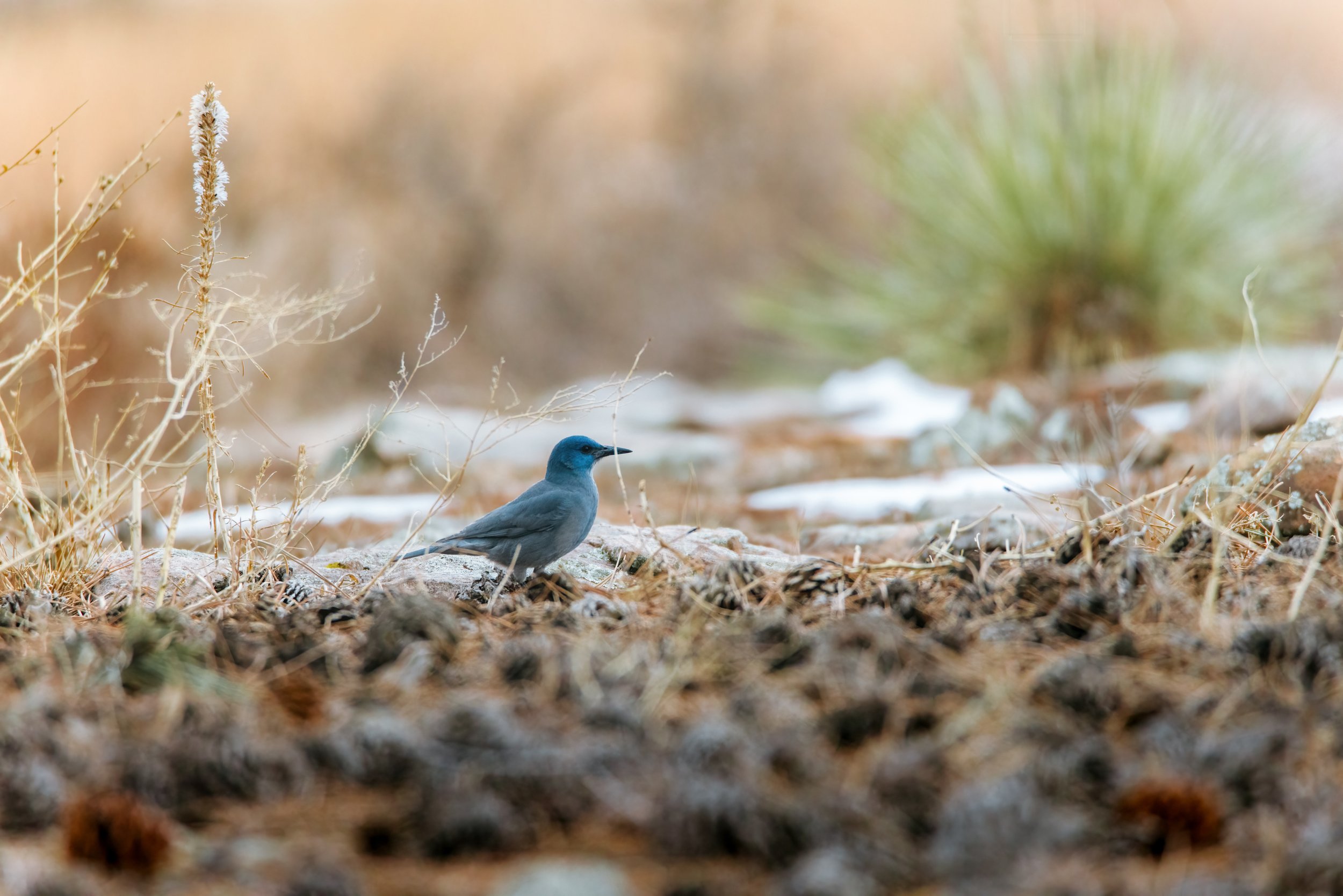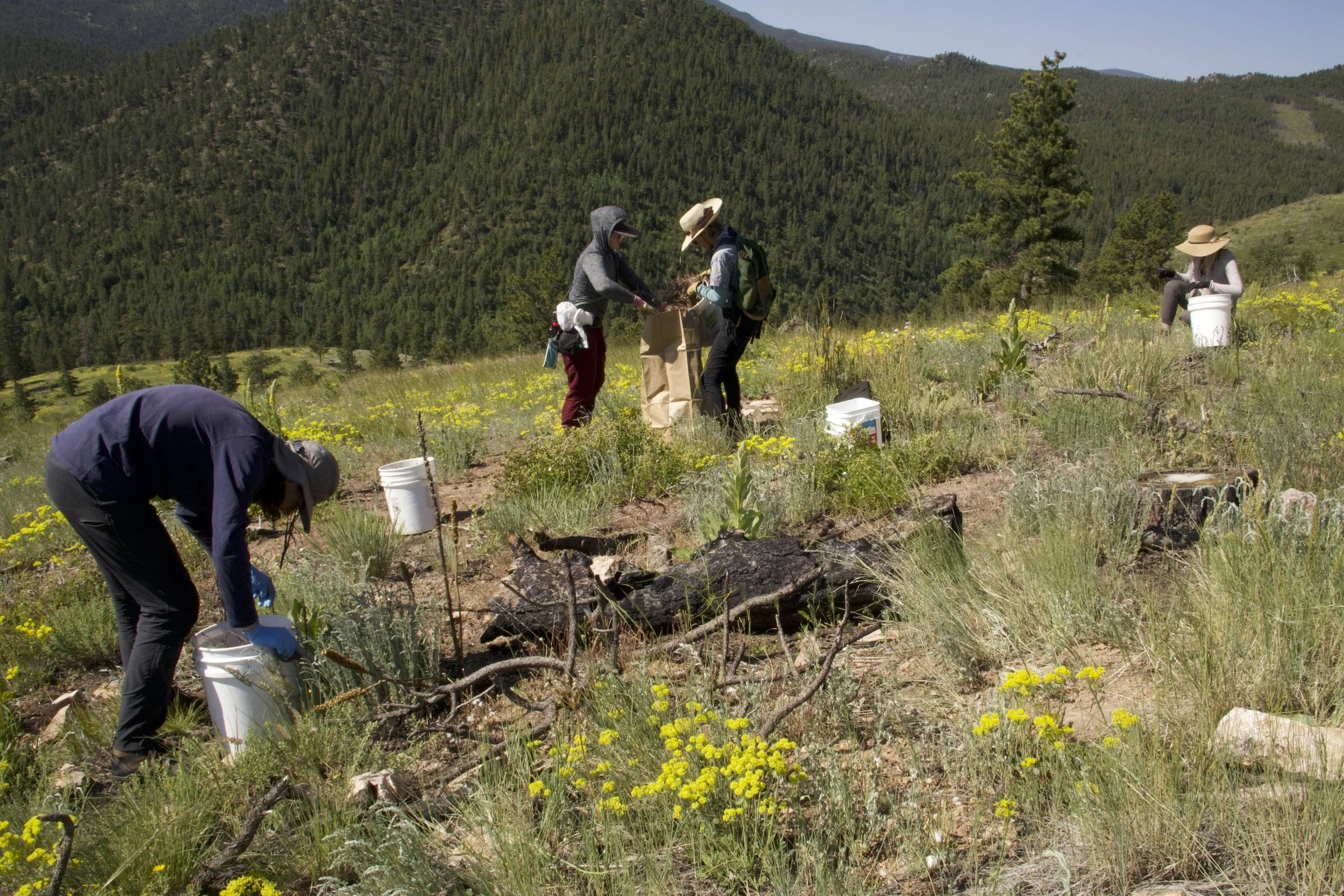
Thank you for engaging with Boulder County land managers!
Your speaking up about pesticide use on Boulder County’s Open Space and the Integrated Weed Management Plan that governs pesticide (specifically herbicide) use on our public lands & waterways has led to the first policy update in over 20 years—finalized in November 2024—which included the banning of aerial spraying from planes, and the removal of 2-4,D, Dicamba, Glyphosate and other chemicals from County weed managers’ “toolkit.”
What’s Happening?
Boulder County’s Parks & Open Space (POS) Weed management and herbicide use policy was updated in 2024 for the first time since 2004, partly due to public demand for change.
In February 2023 many community members in Boulder County learned for the first time that pesticide (specifically herbicide) use on our Open Space lands is widespread. Many of them spoke out via emails to our County Commissioners and in-person testimony at one of the Commissioners’ Town Hall events. Their concern prompted a temporary moratorium on aerial spraying of herbicides while the County’s Weed Management Plan was being reviewed.
The first Draft Integrated Weed Management Plan was released on October 2, 2023, followed by a Draft IWM Plan V 2.0 (the latest plan as of 4/8/24). This plan was approved by POSAC on 3/28/24 with minor changes. On November 8, 2024 they finalized the plan, which is now in place, and will be updated every 3 years.
This website was built to encourage participation in this public process, for the health of our ecosystem and our community.

Updates + Articles
Go To All Resources ➞
Where in Boulder County are herbicides* currently being used on public lands, by whom, and why?
More than 50,000 Acres of Open Space Are Managed Under This Policy
The Integrated Weed Management (IWM) Plan will guide the Boulder County Parks and Open Space (BCPOS) Noxious Weed Work Group. According to the plan, they are currently responsible for approximately 42,000 acres of Parks & Open Space (POS) land designated as natural areas; 7,000 acres of POS land under rangeland agricultural leases that serve as wildlife habitat, 65 miles of trails, and 685 miles of county-maintained rights-of-way. The department is also responsible for vegetation management on other county-owned lands throughout Boulder County.
Please note that this plan does not impact weed control or pesticide use on private property or leased Open Space lands.
Which Chemicals Are Being Used?
Some of the most controversial herbicides on the market including 2,4-D, Glyphosate, Dicamba,* and Indaziflam are being sprayed throughout our open space, along with many others listed at the button link below.
In 2023 POS Weed Management began publishing reports of their herbicide applications online, including the products applied and the target species. According to the Draft IWM Plan, records are kept for 3-years, but the website only listed applications going back to April 2022 at time of this writing.
*Public outcry over the use of these chemicals has resulted in them being removed from the revised draft plan, although dozens of others remain in the County’s herbicide arsenal.
Why Use Herbicides?
The County is using herbicides to eliminate, “control,” or suppress noxious weeds. The Colorado Department of Agriculture’s Noxious Weeds Program keeps an annually updated list that is divided into 4 parts: A, B, C, and a Watch List.
State law requires Boulder County to eliminate all List A weeds and to have a “management plan to stop the spread” of List B species—although nowhere does the state mandate that this need be accomplished with herbicides. For List C weeds, the county is required to have programs to develop “more effective integrated weed management on private and public lands. The goal of such plans will not be to stop the continued spread of these species but to provide additional education, research, and biological control resources to jurisdictions that choose to require management of List C species.” There are no legal requirements for the management of species on the Watch List.
Nowhere does state law specify that herbicides must be used to accomplish any of these objectives. Some people argue that their use is necessary, yet the truth is that our County has a great deal of resources, responsibility, and flexibility in the control methods that it chooses.
*Please note that the IWM Plan only covers herbicide use. Pesticide use more broadly—including insecticides and mosquito control—is also guided by Boulder County’s Integrated Pest Management policy.
TAKE ACTION
The 2024 policy is no win place, but you can monitor herbicide applications and speak out about what you think should change anytime.
1.
Get informed about pesticide use in Boulder County.
Pesticide use is widespread on our public lands. Thanks to the 2024 Integrated Weed Management Policy review process, the County now publicly shares its herbicide applications online, and you can track mosquito spray operations online as well:
2.
Engage in pesticide use reduction advocacy at the State level.
3.
Suggested Talking Points
Even though this policy review process has concluded, you can write to your Commissioners at any time about pesticide use on public lands. Here are some talking points, but you’re encouraged to do your own research and use your own voice.
➜ Thank Boulder County for eliminating Dicamba, 2,4-D, Glyphosate and 3 other herbicides from their “toolkit”, but emphasize that you remain opposed to Indaziflam, and other pesticides currently use on public land. Remember that state law does not mandate the use of pesticides for ANY weed, it does mandate varying levels of management, which does not have to include toxic chemicals.
➜ Thank Boulder County for removing aerial spraying from planes from their revised draft plan—due to public outcry over drift concerns—and emphasize that for the same reasons, aerial spraying from drones should not be allowed either. Hand spraying involves the lowest level of drift risk when chemicals are applied.
➜ Ask for a moratorium on all pesticide use until BCPOS establishes a more science-based, inclusive public process that fully incorporates perspectives from ecologists and other scientists, local nonprofits, community leaders, and staff — much like the County has created through the Fireshed Working Group.
➜ Ask for a moratorium on pesticide use for List B and List C noxious weeds, as well as weeds that are not on Lists A, B, or C. Currently, the County is spraying herbicide to attempt to control more than 65 species on lists, B, C, or watchlist.
➜ Ask for a pilot program, using weed management money, for targeted grazing of weeds using regenerative practices. It’s time for the County to invest in regenerative land managers to manage weeds through targeted, strategically timed grazing and other manual control techniques.
➜ Ask Boulder County to implement a more stringent process for approving individual pesticides for use on public lands. As a point of reference, all 31 of the products listed in use by Boulder County failed the City of Boulder’s more rigorous pesticide approval process, with 2 of the 31 being approved for certain conditions and 1 for special use cases only.
➜ Ask for monitoring of spray sites and downstream water bodies for non-target impacts (insects, aquatic organisms, water, soil, and drift). The current 2024 IWM Plan does not list any protocols for studying short or long-term environmental impacts on water or non-target organisms.
➜ Ask Boulder County what, if any, water testing they have done – at spray sites, along impacted ditches, in surface water, in groundwater. Ask the County to pay for Open Space lease-holders and other downstream neighbors to have their water tested for pesticide impacts.
➜ Ask Boulder County to post every pesticide application going back at least five years and not to destroy the historical data, for use in future environmental toxicity studies.
➜ Ask Boulder County to consider and identify root causes of noxious weeds on public lands and address root causes of land degradation through soil and ecological health efforts.
➜ Ask Boulder County to explain how the use of pesticides fits in with their soil health initiatives and whether pesticide applications could ever interfere with soil health efforts being conducted on Open Space lands.
➜ Add your own thoughts about the direction you want to see Boulder County taking the stewardship of your public lands, your concerns about pesticides, and how you would like this process to unfold.








